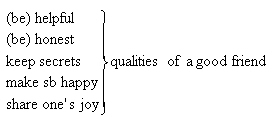课程内容
Unit 1《Friends》(1)
A friend in need is a friend indeed!
患难之中见真情!
It's better to give than to receive.
给予总比接受好。
A friend is never known till a man has need.
需要之时方知友。
Main Tasks
·Comic Strip
·Welcome to the unit
·Language Points
Let's meet Eddie and Hobo and describe them!
Eddie: fat, lazy, funny, interesting
Hobo: clever, lovely, friendly ...
What will happen to Eddie and Hobo now?
Read their dialogue
Picture 1:
Hobo: I'm hungry, Eddie.
Eddie: I have a cake. Do you want some?
Picture 2:
Hobo: You're so kind, Eddie. Can I have something to drink, please?
Eddie: What about some milk?
Picture 3:
Hobo: Yes, please. Can I have some more food too?
Eddie: Sorry, Hobo. There's nothing else in the fridge.
Picture 4:
Hobo: What about the pizza in your bowl? Maybe we can share it.
Review their dialogue
And answer the questions.
1. What does Eddie give Hobo?
2. Is there anything else in the fridge?
3. Why does Hobo want Eddie's pizza?
4. What does Hobo think of Eddie?
5. Why does Eddie give his food to Hobo?
6. Who do you like more/better, Eddie or Hobo? Why?
What do you think of Eddie?
I think that Eddie is ...
helpful: help his friend when ...
friendly: share his food with ...
generous: give his food to ...
(not stingy 吝啬)
Now role-play the conversation!
What makes your friends so special?

Now match the qualities with the questions in A on P7.
A: Daniel is reading on advertisement in 'Teenagers' magazine. He is matching the qualities on the left with the questions on the right. Help him write the correct letters in the boxes.
1. helpfull a. Do you talk to him/her when you are sad?
2. honest b. Do you talk to him/her when you are happy?
3. keep secrets c. Can you talk to him/her about anything?
4. make me happy d. Do you talk to him/her when you have problems?
5. share my joy e. Do you believe what he/she says?
Make a similar dialogue:
A: When you have problems, who do you talk to?
B: My good friend.
A: Why?
B: Because he/she is helpful.
(1) be sad -- make me happy
(2) be happy -- share my joys
What qualities are important in a good friend?
What other qualities should good friends have?
clean and tidy
clever
friendly
funny
good-looking
helpful
musical
generous
polite
Different people have different ideas.
Make sentences like these:
1. I think that to be + adj. is (very important).
2. I don't think that to be + adj. is (very important).
3. My partner thinks that to be + adj. is (not very important).
4. It is (quite important) for my best friend to be + adj.
Language points:
1. You are so kind. 你真好。
kind adj. 善良的
= It's so kind of you.
be kind/polite/nice/good/helpful ... to sb.
We should be kind to all kinds of animals.
我们应该善待各种动物。
2. Can I have something to drink, please?
请问我能喝点什么吗?
Can I...?是表示请求或征求意见的一种句型。我们还可以用Could I...?句型表示请求或征求意见,用could比用can语气更为委婉。但要注意:对Could I...?之类的句型的回答时不用Yes, ...could. 而要用Yes, ... can.或Certainly/Of course/Sure等。
--Can I have a pizza?
--Of course.
--Could I play basketball now?
--Yes, you can.
something用于疑问句中,表示建议、请求等特珠语,希望得到对方的肯定回答。
--Would you like something to eat?
--Yes, thanks a lot.
something to drink/eat/read 喝的/吃的/读的东西
to drink是动词不定式作后置定语,修饰不定代词
something,anything,nothing,everything等不定代词被形容词、动词不定式修饰时,形容词或动词不定式要后置。
something interesing 有趣的事情
There is nothing important in today's newspaper.
今天的报纸上没有什么重要的事情。
He had nothing to say. 他无话可说。
I have something to tell you. 我有一些事情要告诉你。
当形容词和不定代词同时修饰不定代词something等时,其顺序为“不定代词+形容词+不定式”
something delicious to eat 一些好吃的东西
anything interesting to read 任何有趣的读物
everything important to do 一切要做的重要的事
nothing else to eat 没有什么别的可吃的东西
3. Can I have some more food too?
我还能再要点食物吗?
some一般用于肯定句,any一般用于否定句或疑问句。但在一征求对方意见或表达自己意愿的句子里常用some,而不是any。
some more food 另外一些食物,more表示“再,又”
Would you like some more cake? 你想再要一点蛋糕吗?
数词+more+名词=another+数词+名词
I want to buy another two books.
=I want to buy two more books.
She wants to stay here for another 3 weeks.
=She wants to stay here for 3 more weeks.
4. There's nothing else in the fridge.
冰箱里没有其他的东西了。
else adj. & adv. “别的;其他的;另外;其他;还”
(1)else用在something,anything,somebody,nobody,everybody等不定代词之后。
Do you want someone else to help you?
你想让别人来帮助你吗?
I don't have anything else to do. 我没有其他的事情可做了。
(2)else用在what,who等疑问代词之后(但不能用于which之后)。
What else would you like? 你还想要点别的什么东西吗?
Who else wants to see the film? 还有谁想看那部电影?
(3)else用在when,where,why,how等疑问副词之后。
Where else did you go? 你还去了哪里?
一定要将else放在所修饰的词后
辨析:else与other
················
词条 位置 修饰对象 例句
else 位于所修饰词之后 不定代词如something、疑问代词如who或疑问副词如when What else do you want?你还想要别的什么东西?
other 位于所修饰词之前 名词 What other things do you want?你还想要别的什么东西?
nothing=not anything
我的手表没有坏。
There is nothing wrong with my watch.
=There isn't anything wrong with my watch.
Nothing in the world is difficult if you put your heart into it.
世上无难事,只怕有心人。
辨析Maybe与may be
Maybe 副词,作状语,“很可能,大概”=perhaps放在句首。
may be 情态动词+动词原形,作谓语“可能是”。
Maybe you are right. 或许你是对的。
You may be right. 你或许是对的。
... is inviting teenagers to join a writing competition.
(1) invite sb to do sth
(2) invite sb to some place
e.g. I invite her to play basketball.
He invited me to his home.
share my joy
joy既可作可数名词,也可作不可数名词。用作可数名词时,意为“使人高兴的事;一种快乐的情绪”;用作不可数名词时,意为“高兴,愉快”。例如:
On a hot davy, having a cool swim is a joy.
在大热天里,凉爽地游一场泳是一件令人高兴的事。
★此外,joy常见的搭配有:for/with joy(高兴地),to one's joy(使某人高兴的是)。例如:
They jumped for joy/laughed with joy.
他们高兴地跳了起来/高兴地笑着。
To the boy's great joy, his mother buys a bike for him.
使这个男孩很高兴的是他妈妈给他买了一辆自行车。
词汇辨析
believe & believe in
(1)believe有“相信;信以为真”之意,通常用作及物动词,其后可直接接宾语。
例如:
Do you believe his report?
你相信他的报告吗?
I could hardly believe my eyes.
我几乎不能相信自己的眼睛。
(2)believe in有“信仰;信任”之意,常与表示宗教、理论、原则、概念等的名词或人连用,此时的believe是不及物动词。
例如:
They need a leader they can believe in.
他们需要一个可以信赖的领导。
Some people believe in everlasting life after death.
有些人相信死后可以永生。
P6-7重点词组
1、饿了 be hungry
2、一些喝的 something to drink
3、再要些食物 have some more food
4、没有别的东西 nothing else
5、看一则广告 read an advertisement
6、使你的朋友如此特别 make your friend so special
7、保密 keep a secret/keep secrets
8、使我高兴 make me happy
9、分享我的快乐 share my joy
10、和他谈任何事情 talk to him about anything
11、有问题 have problems
12、相信他的话 believe what he say/his words/the words he says
13、干净整洁 clean and tidy
14、一个诚实的男孩 an honest boy
15、写信给我们/收到我们的来信 write to us/hear from us
此内容正在抓紧时间编辑中,请耐心等待
边老师
女,中教中级职称
教育教学教研成绩优异,教学理念先进、教学方法灵活。





